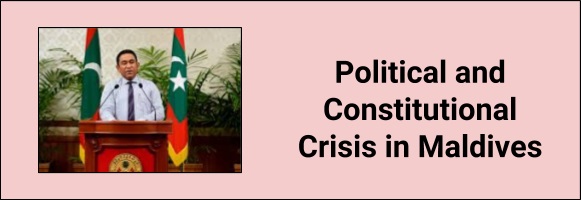NEW! The Gist (FREE) | E-BOOKS |
Political and Constitutional Crises in Maldives : Important Topics for UPSC Exams

Political and Constitutional Crises in Maldives : Important Topics for UPSC Exams
Why in News?
-
On February 5, the Maldivian government declared a state of emergency after Supreme Court’s order to release opposition leaders from the prison. The declaration was followed by a spate of high-profile arrests.
-
Even media has been receiving threats following the coverage of the February 1st Supreme Court ruling that set off the crisis. However, security is provided to government- backed media stations.
-
Opposition leaders of Maldives have advocated India to intervene amid the Constitutional crisis and state of emergency.
What is the issue?
-
Maldives highest Court regarding the release of political prisoners stated that “Dissidents must be released because their trials were politically inspired and flawed”.
-
President Abdullah Yameen, who is considered closer to the China, had instituted an emergency in the country after the Judgement of Maldivian Supreme court to release the political prisoners.
Buy Printed Complete Study Materials for UPSC IAS PRELIMS Exam
Online Crash Course for UPSC PRE Exam
Analysis
-
The Maldivian people fought long and hard for the right to hold free and fair elections and won it only as recently as 2008 and It is definitely not a democratic step; a president forcefully removing the chief justice and a senior judge of the highest court in the country and openly violating the constitution.
-
To ensure a free and fair election in the Maldives later this year, the release of political prisoners could have been a vital step and further it would have been a progressive step towards a mature democracy.
-
Explaination behind enforcing emergency was that the President Yameen wanted to investigate judges and some opposition leaders, consisting of his half-brother and Ex-President Maumoon. Emergency being enforced for such insignificant reasons could be termed as absurd and incompetent.
-
By suspending certain rights that are untouchable even under the state of emergency like the right to a fair trial President Yameen has violated the constitution.
-
The crisis could ruin Maldives tourism-dependent economy.
What has been the international response?
-
Alongside India, the U.S. and the U.K. and United Nations have criticised President Yameen’s government for defying a Supreme Court order and urged Yameen to honor the rule of law and respect the democratic institutions and free the detainees.
-
United Nations (UN) human rights chief has warned that checks and balances necessary in any functioning democracy are being undermined by the Yameen’s state of emergency decree, which had been used to imprison perceived political opponents.
China on Maldives Issue
-
China has advocated for an inclusive domestic dialogue and a home-grown solution to end Political and Constitutional crisis in Maldives.
Maldives’s China Tilt
-
In order to build trade and transport links across Asia and beyond President Abdulla Yameen signed up to Beijing's One Belt, One Road (OBOR).
-
Maldives are in heavy debt to China at almost $2 billion since China has been involved in developing their infrastructure, such heavy debt is almost unrepayable for a small country like Maldives.
-
China is currently the Maldives' major source of tourists, whose spending largely runs the economy, as China is investing millions of dollars in housing, airport, development and other projects.
India’s previous intervention in the domestic affairs of other countries
-
India has occasionally interfered within the internal affairs of countries, like during liberation of Bangladesh from Pakistan in 1971, typically the intervention in the Sri Lankan civil war in the late 1980s or even its more recent engagement in the designing of Nepal’s constitution.
-
Operation Cactus in 1988-India sent 1600 paratroopers, on the request of the then president Abdul Gayoom of Maldives (now a part of the democratic opposition) and took control of the situation. Some people say that India rescued the Maldivian government while some people believe that through this operation, India tried to enhance its influence in the region. Currently, in Maldives, the demand for Indian involvement is by the forces in opposition.
-
In Nepal in 2015-16, the application of an instrument like the economic blockade might have temporarily brought the then K.P. Oli government to its knees but it likewise produced a backlash against India in Nepal’s hilly areas.
What should be India’s Policy towards Maldives?
-
India’s preference should be to ensure the security of Indian tourists and workers in Maldives and Indian intervention should not complicate the problem for Indians living there.
-
India’s involvement should be surgical or curative, for example India should ensure that Yameen government submit on use of constitutional means without harming the people of Maldives.
-
The disastrous intervention of the Indian Peace Keeping Force (IPKF) in Sri Lanka (1987-90) should not be forgotten and it should not be repeated.
About Maldives
- Maldives is a South Asian island nation, situated in the Indian Ocean and it lies southwest of Srilanka and India.
- Maldives, is famous for its luxury hotels, limpid tropical seas and scuba-diving resorts.
MODEL QUESTIONS
Q. Which of the following statement is not true about Maldives?
A. Maldives is a South Asian island nation, situated in the Indian Ocean and it lies southwest of Sri Lanka and India.
B. The Maldives archipelago is located atop the Chagos-Maldives-Laccadive Ridge.
C. The Maldives is a founding member of the South Asian Association for Regional Cooperation (SAARC).
D.Maldives is not a member of the Organization of Islamic Cooperation, and the Non-Aligned Movement.

